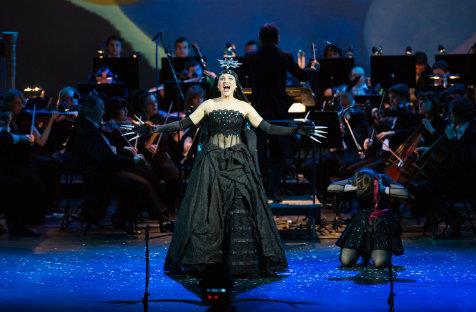Russian opera company Moscow Novaya Opera is currently touring Australia with this unusual production that blends opera, ballet and classical music. We sent reviewers to see it in both Sydney and Melbourne; here are their rather different takes on proceedings.
Sydney: Tomas Boot
There was to be ballet on the program, and to say that I was worried would be an understatement. It’s not, as you might suspect, that I have an aversion to ballet. Certainly not. But Operamania (a concert including many of opera’s greatest hits) was to be performed at the City Recital Hall, and the City Recital Hall, while being a near-perfect venue in which to hear a panoply of musical wonders (with its lovely acoustics and cosy atmosphere) is nevertheless not the biggest stage in Sydney. Not the biggest stage for dancers to leap and bound across like swift gazelles over the wide and graceful plains. One began to worry that, there not being enough room, a ballerina might, mid-air, smack into a wall, resembling less a gazelle and more an uncoordinated puppy sliding down a thin and slippery hallway.
Adding to my concern – but also my delight – was that there was to be a symphony orchestra in attendance (the Moscow Novaya Opera Orchestra), which, while providing the best possible musical backdrop for the singers and dancers, would also crowd the already cramped stage. Sometimes – when Pinchgut Opera takes over the venue, for example – the orchestra is relegated to the first few rows of the stalls (with the seats removed), such that the entire stage is free for the sets and artists. Here, this wasn’t the case, resulting in the musicians seeming very tightly packed, with the percussion standing halfway through the open doorway to the wings. There was a sizeable stage-extension covered with black linoleum, however, and this was where the dancers and singers performed for the evening.
The dancers, it seemed, solved the problem of lack of space by having their wings clipped, such that there was nary a full leap to be seen, but, fortunately, this did nothing to diminish the unexpected beauty of it all. (The dancers, four in all, were from the Imperial Russian Ballet.) One number, for instance, was dancer Yaroslava Araptanova moving to Saint-Saens’ ‘The Dying Swan’, oscillating en pointe the entire time in one of the highlights of the night. Many a dance from Tchaikovsky’s The Nutcracker was also seen and heard, with as much vigour and energy as one could want.
Indeed, there was a level of energy throughout the night that was unexpectedly high, as the audience was given little time to think before the orchestra was at it again, and the next singer was making their way to centre-stage. And this was part of my slight problem with the evening, namely that it felt like a greatest-hits-without-pause.
Perhaps, having seen so many concerts over these many years, I’ve become accustomed to having to wait three hours while the seats of the violinists are moved and a piano is wheeled into position, but I think I would’ve liked a little more time to reflect on what was happening. Part of the reason for this chaotic inertia was that each aria was somewhat tenuously tied into the last – two women of equal and unsurpassed beauty competing against each other in Verdi’s Sicilian Vespers: Merci dilette amiche, are suddenly, come the next song, trying to woo Romeo singing in Gounod’s Romeo and Juliet: Ah, leve-toi, soleil! There was also a motif with umbrellas that was confusing. The occasional medleys – such as one focusing on Mozart – that let the orchestra have the full attention of the audience, also suffered from this, though to complain about a medley being a medley (and therefore getting through a lot of musical material in a very short amount of time) seems to be a tad unfair. Nonetheless, one would have preferred – when it came to the medleys – one long piece, rather than many short ones.
But, all that being said, this was still an entertaining evening, with the singing of a high quality, and the dancing as well. Costumes, too, were most impressive, with new dresses and suits for each aria. (If anyone has ever watched a Proms concert, you would know that you don’t always have the sopranos changing their appearance for every aria. The performers here certainly got into their characters.) We heard music from Carmen, from The Barber of Seville, Turandot, The Magic Flute and The Italian Girl in Algiers, as well as Faust, Iolanta, Norma, Rigoletto, The Tales of Hoffmann and Die Fledermaus. Tchaikovsky and Strauss got some orchestral mentions, while the piano medley consisted of Chopin waltzes, a piece of Liszt, and a prelude from Rachmaninov.
These kind of greatest-hit concerts are something that you usually only want to hear about once a year – maybe once in every two years – and one would be hard-pressed to find a slicker production than that which Operamania gave.
Rating: 4 stars out of 5
City Recital Hall Angel Place, Sydney
14 April
Melbourne: Heather Leviston
Operamania’s kaleidoscopic rush through the top of the operatic pops coupled with excerpts from popular classical orchestral, piano and dance items felt like the musical equivalent of speed dating. There was plenty of energy in the room and, in this case, an abundance of talent, but often there was insufficient time to experience more than a taste of the music.
With more than 30 items being packed into 100 minutes, it was perhaps inevitable that the music was not always well served. The piano medleys in particular sometimes sounded like a Spicks and Specks identify-the-tunes segment – wasn’t that the theme from Elvira Madigan rushing by? It was often a case of an excerpt from an excerpt and transitions were not always smooth. The excerpt from the first movement of Tchaikovsky’s Piano Concerto No. 1 was played skillfully by Ekaterina Kolpakova, but the sudden morphing of the concerto into a Chopin/Liszt/Rachmaninov medley came as a jolt.
Despite the uncomfortable compression, there was much to enjoy in this fast-paced, polished entertainment. Lavish costumes were changed continuously, adding to the interest and excitement, and stage business was generally imaginative, if occasionally excessive and meaningless. The ten singers were generally impressive with secure, well-projected voices. They brought considerable verve to semi-staged arias and ensembles from works by Bizet, Rossini, Mozart, Gounod, Verdi, Puccini and Offenbach. Disappointingly, there was only one item from the Russian repertoire. Anton Vinogradov’s fine rendition of a baritone aria from Tchaikovsky’s last opera, Iolanta, raised the question of why more Russian opera had not been included.
As was to be expected, ‘Nessun Dorma’ was a featured item. Oleg Dolgov’s strong, relaxed tenor voice elicited the enthusiastic response it deserved. Yaroslav Abaimov’s lighter tenor was very well suited to Gounod’s ‘Ah, lève-toi, soleil!’ from Romeo and Juliet and was a pleasure to hear throughout the evening. Elena Terentieva’s bright, flexible soprano and vivacious personality shone in the ensembles and in Offenbach’s ‘Doll Song’, adding substantially to the vocal thrills and fun element of the evening.
It is a pity that balletomanes may have missed out on some of the better moments of the program. The title, Operamania, certainly does not conjure up Saint-Saëns’ The Dying Swan. Accompanied by Alexander Sokolov’s warm, sympathetic cello, Yaroslava Araptanova’s dancing of this gem was beautiful and moving. Despite the limited space entailed in having to share the stage with a small orchestra, her performance in two pas de deux, from The Nutcracker and Sleeping Beauty, displayed some of the finer features of Russian dance. While little athleticism was required of the male dancers, Alexander Volkov made a reliable partner for Araptanova.
Under Andrey Lebedev, the orchestra gave a sturdy account of the music. Behind the orchestra, a backdrop of paintings by Russian artists provided a continuously moving series of projections, which sometimes bore a connection with the music being performed. As a showcase for Russian operatic (and dance) talent, this was a colourful and entertaining, if ultimately unsatisfying, experience.
Rating: 3 stars out of 5
Hamer Hall, Melbourne
19 April
Operamania
Moscow Novaya Opera
Conductor: Andrewy Lebedev
Dancers from the Imperial Russian Ballet
Additional performances:
Llewellyn Hall, Australian National University, Canberra – 23 April
Concert Hall, QPAC, Brisbane – 28 April





